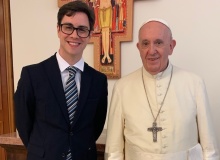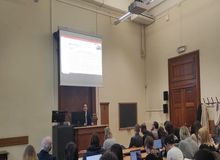


On the occasion of Pope Francis’ death, I would like to honour the posture of respect and esteem he nurtured towards evangelical Christians.

Four ways Lausanne’s latest congress in Incheon-Seoul impacted global evangelicalism.
.jpg)
We need polycentric leadership that draws on the resources of the worldwide body of Christ. Global wisdom is the antidote to the hidden virus of cultural captivity.

By casting the sorrows that tempt us toward overwork or other escape mechanisms to Christ, we become serene and rich in spirit.
.jpg)
Don't think you will find God in romance. Don't believe in the Romantic Solution as a blueprint for life and redemption.

Satisfaction of desires is the wrong door to knock on if we expect happiness to be waiting on the other side.
.jpg)
I confess that, in my younger years, dedicating a few months to personal and spiritual renewal sounded like a fancy excuse for throwing the towel and abandoning the ministry’s trenches.
.jpg)
Christians & European elections. In the Netherlands and Romania, believers express disappointment with the main ideologies in Brussels. In France and Italy, the EU is perceived as distant.
.jpg)
Today, secular Europeans have a very acute radar. They crave substance, not hype; what is real, not what is fake. They want God, not Christianity-lite. How can we meet this commendable need? By raising the bar spiritually.

Christians like me celebrate that God has come to us and offered us respite. He has declared his favour on fragmented and divided hearts.

The president of the Italian Evangelical Alliance, Giacomo Ciccone, spoke about religious freedom in a lecture held at the Faculty of Law of the University of Padua.
.jpg)
As Christians, we’re called to model humility and civility in our interactions with people of other faiths and deep interest in the issues of public concern.

Art can help us unwrap the riches of Scripture. Our world was created by the greatest of Artists, after all.
.jpg)
Let's be encouraged to persevere in the hard but blessed work of local ministry.
.jpg)
Before we act on strong emotions, wreck friendships, and disrupt churches, we would be wise to examine why we feel hurt and angry.

Tim Keller, Tim Vreugdenhil, Stephan Pues, and René Breuel analyse what can the world learn from Europe about evangelism.

When we consider new ideas, our inner radar ponders, “Is it popular?” as much as “Is it true?”.

In challenging circumstances, European evangelicals share a message of hope.

Recently, I came across another delight: prayers that have been written by other people across the centuries.

A lot of our issues lie in the interpersonal domain. Relationships shape all of us, including the way we relate to ourselves and to God.

The COVID-19 pandemic is spreading suffering around the world – but it can also teach precious lessons to individuals, churches, and nations.

In mourning and in lockdown, believers may experience the power of Easter’s surprise: the arrival of someone who meets us in seclusion and whispers, “peace be with you”.

Exile can be fruitful and fertile when we see it as a season to build, to love, and to pray.

I lead a congregation in Rome that thrives on handshakes, greet kisses, and physical contact. This winter, the coronavirus has taught Italians the cautions of distance and isolation.

For many Christians outside the United States, American Evangelicals’ unwavering support for President Trump is bewildering.

Las opiniones vertidas por nuestros colaboradores se realizan a nivel personal, pudiendo coincidir o no con la postura de la dirección de Protestante Digital.